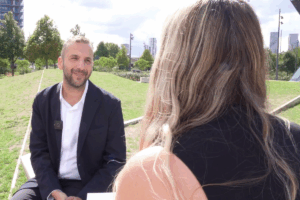
Three years ago, Felix Wunnike realized he had struck a chord with young people. Whenever the business psychology graduate posts videos on his TikTok account about “finding friends,” his followers respond immediately.
“Even when I just said in the video, ‘Send this video to your best friend,’ the top comment with the most likes was always something like, ‘I don’t have any friends,'” Wunnike told DW. “I noticed that many of my younger followers feel really lonely and say that they really don’t have any friends at all. That shocked me a lot.”
While loneliness can make it more difficult for adults to find a job and keep it, for young people it can affect their grades in school. Wunnike has now written a self-help book entitled “Everything You Need to Know About Finding a Friend.”
Wunnike has identified two reasons for this trend: the COVID-19 pandemic and social media.
“Despite all the positive aspects, I think it’s important to warn people about the downsides and dangers of social media usage, namely that we forget about real life. When we look at our friends’ Instagram stories, we overlook the importance of building friendships in real life.”
Loneliness can lead to authoritarian thinking
According to a recent study by the World Health Organization, one in six people worldwide feels lonely. Among teenagers, it’s even one in five. Loneliness is becoming an increasingly serious problem in Germany, according to a survey carried out by one of the country’s leading public health insurers late last year.
Loneliness hurts — and that’s hardwired in our brain
To view this video please enable JavaScript, and consider upgrading to a web browser that supports HTML5 video
Young people who suffer from loneliness are more susceptible to authoritarian thinking, according to Claudia Neu. The sociologist has studied what happens when loneliness causes young people to stray down a path of political extremism. She led a study which examined the connection between loneliness and anti-democratic attitudes among young people in Germany, and came to a pretty discouraging conclusion.
“Young people between the ages of 16 and 23 are particularly susceptible to conspiracy theories and tend to condone the use of political violence,” said Neu. “It’s important to note that while a statistical correlation has been found, it does not necessarily imply causality. Not every lonely person votes for the far-right Alternative for Germany, nor does every AfD voter have elevated levels of loneliness.”
Neu has now written a book on this topic, entitled “Loneliness and Resentment.” Her thesis is that when people no longer feel connected to society and, worse still, react to this with resentment, there is a real potential threat to democracy. She argues that lonely people are in fact victims, having experienced discrimination much more frequently than people who are not lonely.
“They repeatedly feel rejected. They are frustrated when at a social get-together they once again fail to connect with anyone and return home feeling alone,” she said. “This type of rejection can generate resentment. And this they see as unfair and are unable to let it go, blaming others, and ultimately becoming bitter and angry.”
‘Higher risk of loneliness’ in rural areas
Neu has headed the Sociology of Rural Areas department at the universities of Göttingen and Kassel since September 2016. She said living in remote areas increases the likelihood that people feel lonely, because humans depend on interaction and communication.
“If there is a lack of opportunities to meet people, then there is a significantly higher risk of loneliness,” Neu told DW. This then changes perceptions, she said, adding that she has found that chronically lonely people perceive spaces differently.
“They see their surroundings as darker and more unsafe, they feel less comfortable both in public and in private spaces. And they are less likely to believe that their community can work well together,” she said.
Rise in single-person households
A survey conducted by health insurer Techniker Krankenkasse showed that around 60% of people in Germany say they experience loneliness in their private lives. According to the Federal Statistical Office, 17 million people in Germany live alone — that’s one in five. This represents an increase of 22% over the past two decades.
According to Neu, the increasing individualization of society has both positive and negative aspects. “On the one hand, people have more freedom to choose. It has become much easier to end an unhappy partnership. On the other hand, being alone also carries the risk of becoming isolated. Nevertheless, I would be cautious about drawing a direct connection between living alone and loneliness,” she warned.
Dancing — the best remedy for loneliness
To view this video please enable JavaScript, and consider upgrading to a web browser that supports HTML5 video
Does loneliness increase with age?
Most studies have indicated that the elderly are more likely than young people to feel lonely. Their partners and friends pass away, and their family may not be living close by.
However, a recent study by the German Center for Gerontology paints a more nuanced picture. According to the study, people between the ages of 43 and 65 feel lonelier than those in old age.
Stefan Stuth, who co-authored a survey entitled “Loneliness in the Second Half of Life,” told DW that unemployment is a major problem. Those who lose their job in middle age feel ashamed and stigmatized. The loss of what they see as a meaningful occupation can drive them into self-imposed isolation, he said.
The elderly, on the other hand, do not experience this problem. “Reaching retirement age means you no longer have to be employed. There is no longer a stigma of unemployment that leads to mental suffering,” Stuth explained. However, he added, the factor that has the greatest influence on loneliness is wealth or poverty.
“The lower the household income, the higher the level of loneliness,” he said. “Those with low incomes and limited financial resources have fewer opportunities to participate in society. This, in turn, leads to isolation and has a negative impact on psychological well-being.”
This article was originally written in German.
While you’re here: Every Tuesday, DW editors round up what is happening in German politics and society. You can sign up here for the weekly email newsletter, Berlin Briefing.





